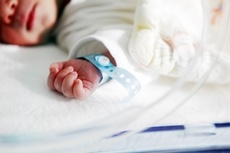SSRI Birth Defects

Recent research has indicated that the use of SSRI (selective serotonin reuptake inhibitor) antidepressants during pregnancy may increase the likelihood for certain birth defects. The manufacturers of several SSRIs, including Prozac, Paxil and Zoloft, recently faced litigation over the drugs’ potential to harm an unborn child.
SSRI Legal Investigation
Bernstein Liebhard LLP is currently investigating the possible link between the use of SSRIs and birth defects. If your child was born with a serious congenital abnormality following in-utero exposure to an SSRI antidepressant, please contact our Firm today by calling (888) 994-5118.
Antidepressants and Birth Defect
Birth defects that may be associated with the use of SSRIs in pregnancy include:
Persistent pulmonary hypertension of the newborn (PPHN):
- PPHN is a potentially-deadly birth defect that impacts a baby’s heart and lungs. The condition occurs when a newborn infant does not adapt to breathing outside the womb. These babies may require a mechanical ventilator and other intensive care support to survive. If severe, PPHN can result in multiple organ damage, including brain damage, and even death. The U.S. Food & Drug Administration (FDA) first warned about the potential association between PPHN and SSRIs in 2006. But it 2011, the agency issued an update stating that the extent of any connection has yet to be determined.
Heart Defects:
- In 2006, a Danish study reported that expectant mothers who used SSRIs in their first trimester were 60% more likely to give birth to a baby with a heart problem compared to the general population.
- In 2009, the British Medical Journal reported that babies exposed to more than one type of antidepressant in the first trimester were three times more likely to be born with a septal heart defect (hole in the heart). Zoloft and Celexa were associated with the greatest risk.
- In June 2011, a study published in Obstetrics and Gynecology suggested that women who were treated with antidepressants during the first trimester are twice as likely to have babies with isolated ventricular septal defects and four times more likely to deliver babies with right ventricular outflow tract defects.
Neural Tube Defects
- Research published in the New England Journal of Medicine in June 2007 suggested that mothers who took SSRIs one month prior to conception were more likely to have a baby with anencephaly, craniosynostosis and omphalocele.
Cleft Lip/Cleft Palate
- The Danish study published in 2006 also reported that a babies exposed to SSRIs were more likely to be born with a cleft lip or cleft palate. Several other studies have reached similar conclusions.
Autism
- In 2016, research published in JAMA: Pediatrics suggested that the use of the SSRIs in the latter two semesters of pregnancy might increase the risk of autism spectrum disorder by as much as 117%.
Was Your Baby Born With a Birth Defect Following SSRI Exposure?
If your child was born with a serious birth defect following pre-natal exposure to an SSRI antidepressant, the nationwide law firm of Bernstein Liebhard LLP may be able to help. To learn more, please call (888) 994-5118 to schedule a free, no-obligation review of your case.
- NCBI (2006) “SSRI Antidepressants and Birth Defects” http://www.ncbi.nlm.nih.gov/pubmed/17167929
- BMJ (2009) “Selective serotonin reuptake inhibitors in pregnancy and congenital malformations: population based cohort study” http://www.bmj.com/content/339/bmj.b3569
- MedPage Today (2011) “More Evidence SSRIs in Pregnancy Boost Birth Defect Risk” http://www.medscape.com/viewarticle/745430
- NEJM (2007) “Use of Selective Serotonin-Reuptake Inhibitors in Pregnancy and the Risk of Birth Defects” http://www.nejm.org/doi/full/10.1056/NEJMoa066584
- org (2011) “Causes of Cleft Lip and Cleft Palate: SSRIs” http://www.cleftsmile.org/reports/CleftSmile_SSRIs.pdf
- JAMA Pediatrics (2016) “Antidepressant Use During Pregnancy and the Risk of Autism Spectrum Disorder in Children” http://archpedi.jamanetwork.com/article.aspx?articleid=2476187
Get the latest news and litigation updates about this case by following us on Facebook. Click the "Like" button below.
Follow Us


